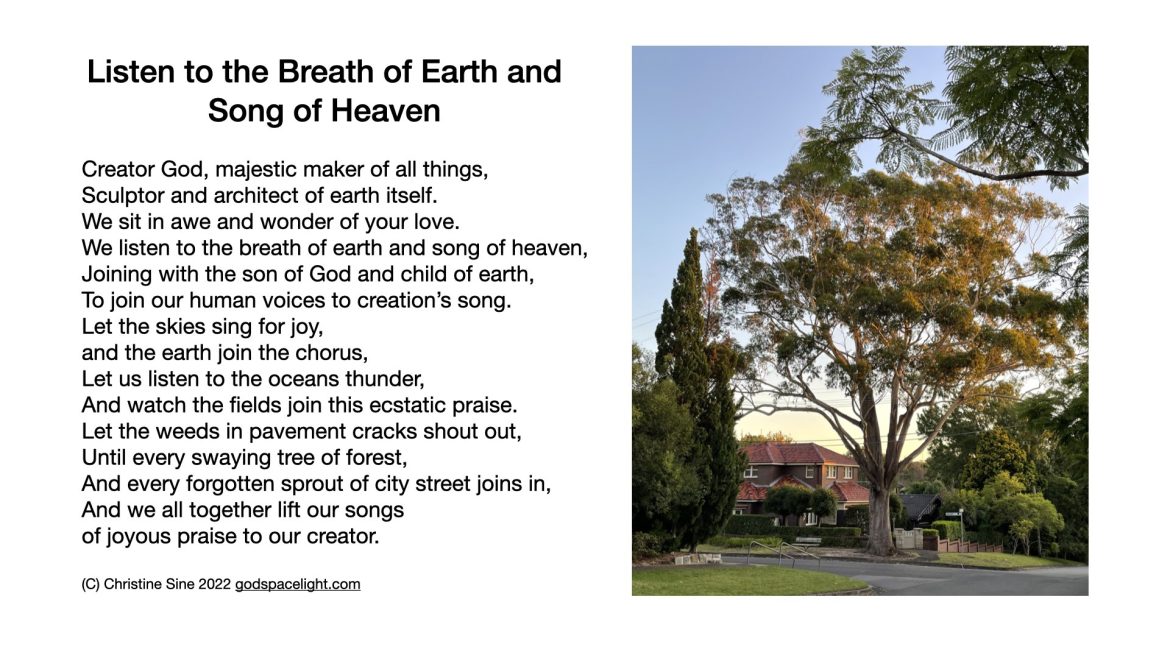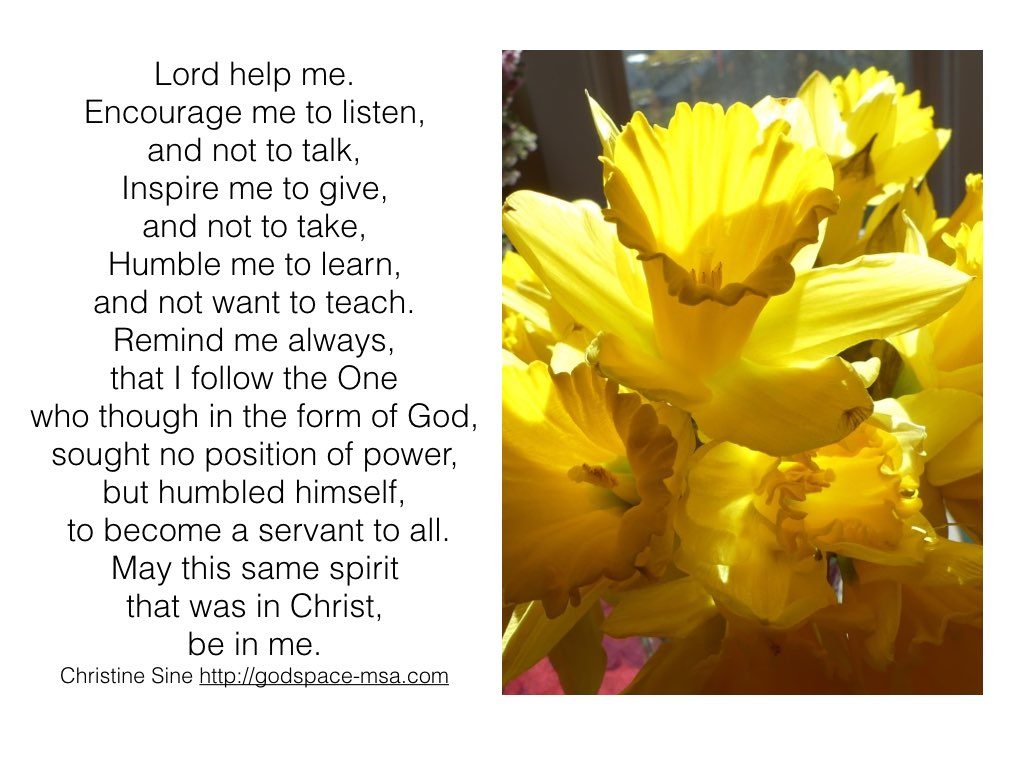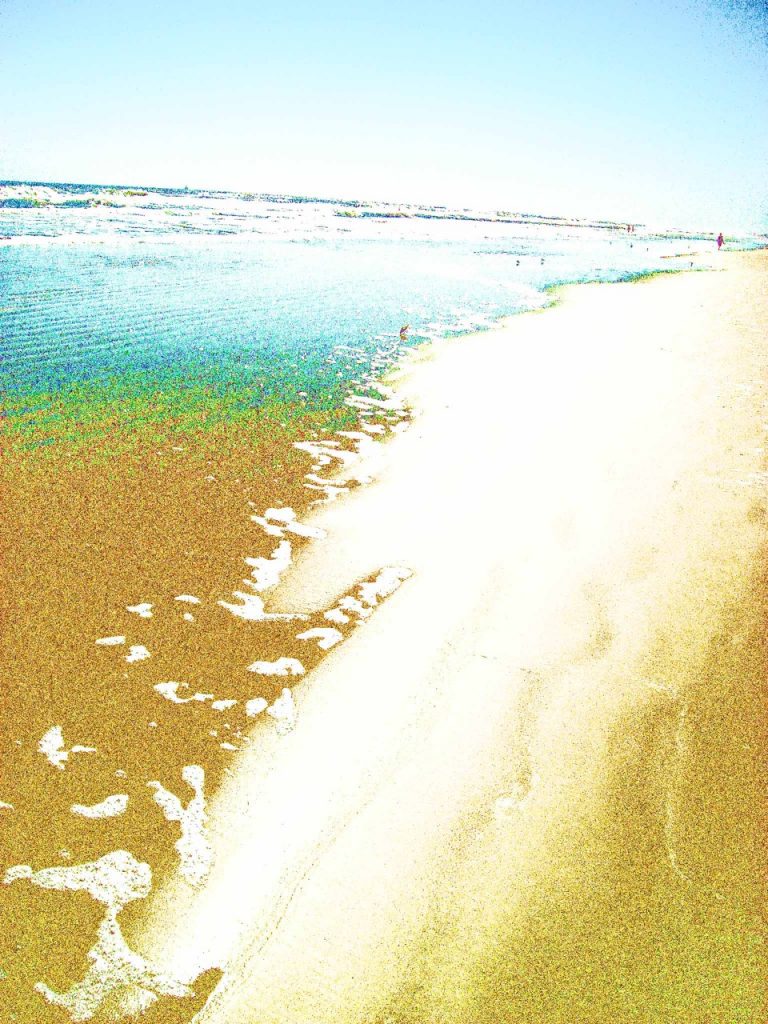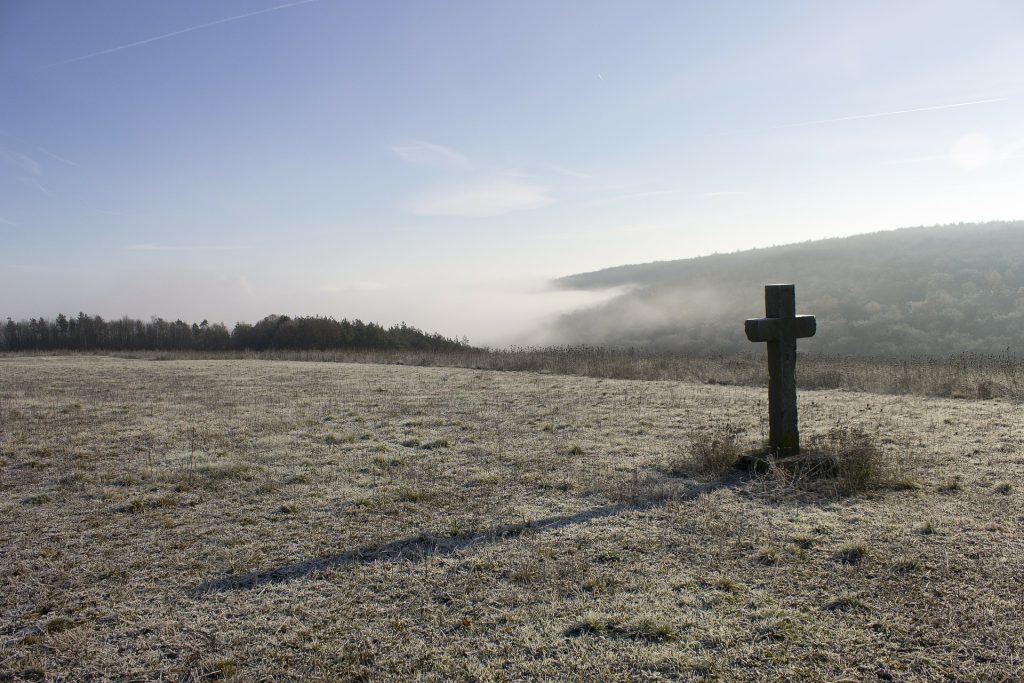by Christine Sine –
Earth day, one of my favourite celebrations, is April 22nd 2023. It is the 53rd Anniversary so I thought it was time to remind you of some of the resources that we make available through Godspace each year.
- Our free resource, Creating a Faith-Based Community Garden, is full of links, liturgies and ideas for creating both your personal garden and a faith-based garden in your community or church. We also post additional resources regularly on the Facebook page, To Garden with God and I highly recommend this wonderful garden reflection from colleague, Andy Wade.
- Circlewood offers a variety of resources for your Earth Day experience. Whether you listen to their Earthkeepers podcast or read their blog/newsletter articles through The Ecological Disciple, you will be immersed in the connection between Creator God and the created world.
- The official Earth Day website shares opportunities to get involved either in person or online with others that are celebrating Earth Day. The theme for 2023 is “Invest in Our Planet”.
- Nurya Love Parish has put together an excellent resource entitled The Christian Food Movement.
- A Rocha Canada, once again invites us to celebrate Good Seed Sunday with them.
- Let All Creation Praise has links to a number of great resources.
- Australian Religious Response to Climate Change is a multi-faith network committed to action on climate change and offers Climate Action Kits in five different religions: Buddhist, Christian, Hindu, Islamic, and Jewish. They are available as a free download.
- GreenFaith offers resources including multi-faith eco-spirituality prayers, liturgies and music that would be a great addition to your Earth Day celebration.
- Check out the detail from Blessed Tomorrow’s Carbon Offset Program and see if your house of worship would consider participating.
- Blessed Earth posted downloadable tip sheets for better stewardship and creation care for Earth Day and other various areas of life.
- National Religious Coalition on Creation Care‘s resource list is worth looking over as it contains literature, prayers, and other resources on Climate, Energy, Forests, etc.
- Green heart education has some good Earth day prayers from different religious perspectives.
- The Green Good News share insights on how to “integrate sustainable living and Christian discipleship”. Check out their local initiatives page for ideas to implement in your neighborhood and church.
- Interested in a free, downloadable one-hour program for Earth Day? Catholic Climate Covenant has what you are looking for.
- A local Seattle group called Earth Ministry offers resources for Earth Day as well as other holidays too.
- #CareForCreation started by Creation Justice Ministries is a great way to share on social media and link with others who are advocating for creation care. Consider sharing this list of 52 Ways to Care for Creation for Earth Day.
- Creation Justice Ministries has a wonderful resource centre. with resources on many aspects of creation care including bible studies, liturgies, information sheets and much more.
- Interfaith Power & Light has many resources available including a list of Climate Prayers and Sample Sermons.
- Young Evangelicals for Social Action an organization that exists to equip, empower, and catalyze young Christians to love God and love our neighbors through bold, wholehearted, and faithful climate action in our church and community in order to create a more just, equitable, and loving world. They are well worth supporting and joining.
- The Green-Changemaker Challenge is an exciting competition, a collaboration between Ashoka and HSBC, This global innovation challenge is open to changemakers with solutions that are equipping others with the mindset and capabilities to contribute towards building a sustainable and equitable world.
A Few Books to Read
The list became too long so we made it into another post: A Prayer and My Favorite Books for Earth Day, please have a look as this list keeps growing.
It is impossible for me to list all the books that make good reading for Earth Day from a faith perspective.
Resources for Kids
Check out our resource page for celebrating Earth day with kids!
Godspace Resources
Earth Day Resources on Godspace:
Here is a compilation of all the resources posted for Earth Day over the last few years:
- Getting Ready for Earth Day – Resources for Kids
- Earth Day in the Neighborhood – Top 10 Ideas
- Time to Love and “Restore Our Earth” by Lisa DeRosa
- Celebrating Earth Day 50! by Tom Sine
- Native American Prayers for Earth Day
- Celebrate with All Creation
- Earth Day Prayers from 2015
- Garden Blessing for Earth Day
- A Garden blessing for Earth Day 2013
- Earth Day Liturgy
And my favourite Garden liturgy which includes the responsive reading below.
Adapted from Ps 65:5-12
God you call forth songs of joy from all the earth
You answer us with awesome deeds of righteousness,
God our Saviour you are the hope of all the ends of the earth
You are the hope of the farthest seas,
When morning dawns and evening fades
You call forth songs of joy
God you call forth songs of joy from all the earth
You care for the land and water it;
You enrich it abundantly.
The streams of God are filled with water
To provide the people with grain,
For so you have ordained it.
God you call forth songs of joy from all the earth
You drench its furrows and level its ridges;
You soften it with showers and bless its crops.
You crown the year with your bounty,
And your carts overflow with abundance.
God you call forth songs of joy from all the earth
The grasslands of the deserts overflow;
The hills are clothed with gladness.
The meadows are covered with flocks
And the valleys are mantled with grain;
They shout for joy and sing
God you call forth songs of joy from all the earth
Check out all our earth day and garden liturgies and prayers on our Creation Spirituality page.
by Christine Sine –
Practicing resurrection is simple I commented in last week’s meditation Monday, but it is not as simple as I expect when it comes down to the nitty gritty of the ways I interact with others. My tendency to want to talk when I should be listening, to try to take when I should be giving and to insist on teaching when I should be learning often gets in the way.
Teaching, talking and doing are so often about our agendas rather than God’s. If we look deep within ourselves we realize that it is our desire to let others see how much we know or how important we are that drives us rather than what God knows and desires (and often we confuse the two).
I call myself a contemplative activist, and as I think about that today I realize how important that sequence is. Activism needs to be grounded in contemplation. We should to go into the world with a listening and learning attitude or otherwise our actions can hurt rather than heal.
What is Your Response?
Sit quietly, close your eyes and reflect back over your activities this past week. What occasions come to mind in which you should have been listening rather than talking, taking rather than giving or learning rather than teaching? Are there people that were hurt or projects that were harmed as a result? Is there something that you could do in this coming week to rectify this?
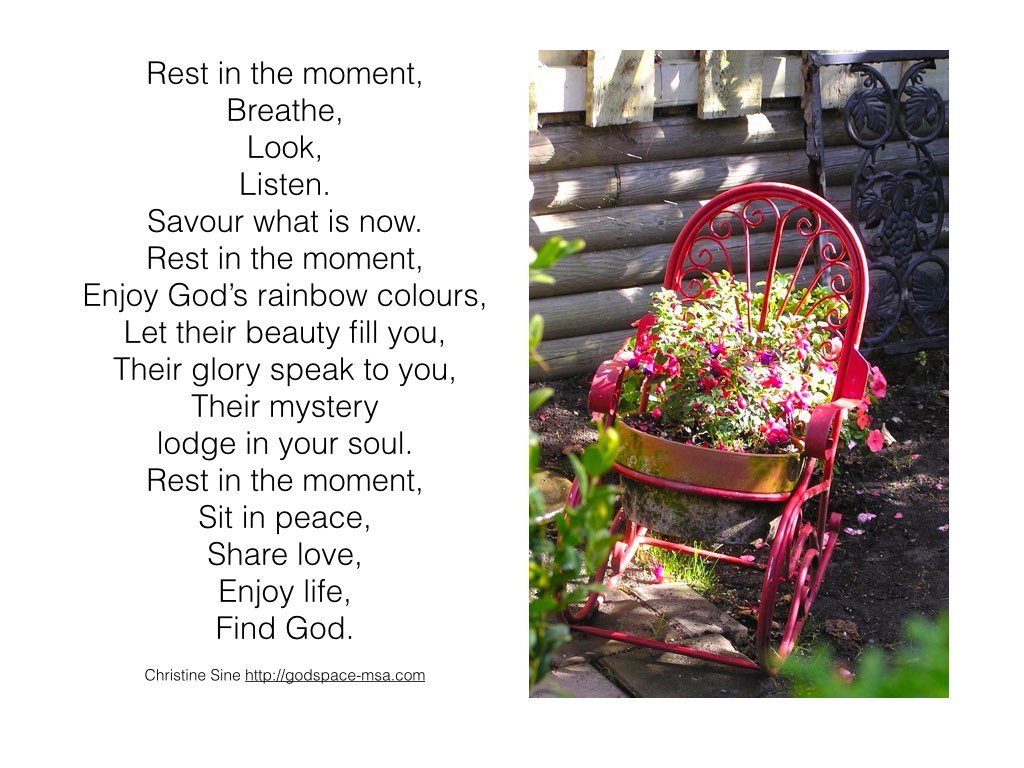 This prayer is one that I wrote a couple of years ago during a time of real struggle with my tendency to get my priorities of listening, learning and giving mixed up with the compulsions to talk, take and teach. I need these constant reminders to keep me focused and to reset my priorities so that I do practice resurrection as much as possible in my daily life.
This prayer is one that I wrote a couple of years ago during a time of real struggle with my tendency to get my priorities of listening, learning and giving mixed up with the compulsions to talk, take and teach. I need these constant reminders to keep me focused and to reset my priorities so that I do practice resurrection as much as possible in my daily life.
What is Your Response?
Sit quietly in the presence of God with your hands in your lap, palms facing upwards. Take a few deep breaths in and out. Read through the prayer above several times, then watch the video below. Relax yourself in the presence of God allow the words “In quietness and trust is my strength” to lodge deep within your soul. Are there new ways that God is asking you to practice resurrection through contemplation? How might your activism be more strongly grounded in these practices?
By Andy Wade –
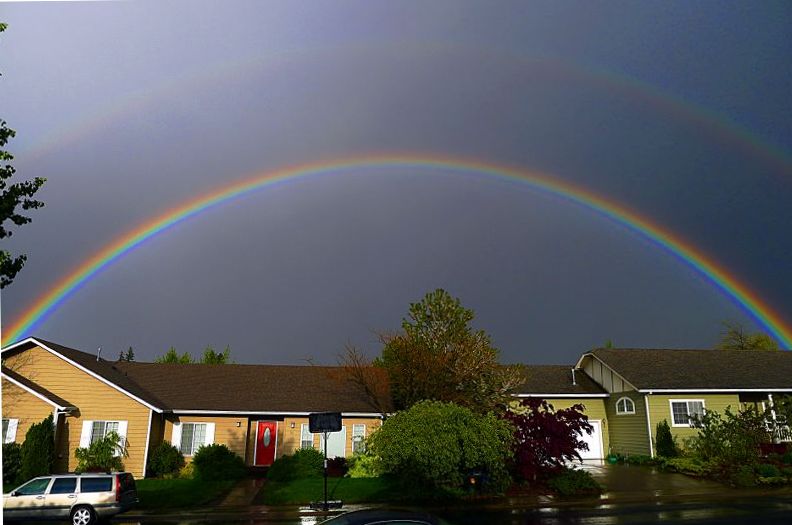 Resurrection is all well and good, but what does it mean for my neighborhood? That may sound a bit irreverent, but that thought kept running through my mind as I planted seeds for our garden.
Resurrection is all well and good, but what does it mean for my neighborhood? That may sound a bit irreverent, but that thought kept running through my mind as I planted seeds for our garden.
Over the past few years I’ve been exploring the idea of gardening with God and neighbor in mind and what it means to move from boundaries to hospitality in the garden.
This has been a profound journey of baby steps that has opened my mind, as well as our front yard, to a deeper level of sharing the hospitality of God.
Back to my question, “What does resurrection mean for my neighborhood?” If I stick with the narrow view of Jesus’ death and resurrection, then, for my neighborhood, it simply means figuring out how to get more people on the bus to heaven. But in the context of the larger story of God, resurrection is about God, through Jesus, drawing the whole creation together (Eph. 1.9-10, Col. 1.19-21, Rom. 8.20-24). Jesus is the Prince of Shalom, the Great Reconciler, the healer of our brokenness, and the one who makes all things new.
As I continue to ponder these deep, theological concepts, I’m tempted to just stay there, in my head, marveling at the greatness of God. But that does little for my neighborhood. Instead I’m forced to ask, what’s going on in my neighborhood? What good is already happening? Where are the points of brokenness, even division? Are there deep hurts or isolation? As I ask these and other questions then I can look back at my yard and ask, how can this be a place that fosters healing, reconciliation, friendships and support. In short, how can this become a garden of shalom where people, animals, and nature can flourish in the newness made possible in Christ?
These are big, potentially overwhelming questions. Sometimes when my mind goes in this direction, I either become trapped in heady theological gymnastics, or I become paralyzed by the seeming enormity of it all. But yesterday as I sat in my church’s Easter worship service, an image came to my mind. It was of a kayak quietly cutting through glass-like water. In its stealth-like movement it would be easy to miss, but behind this kayak was a wake. Not a huge wake, but rather small, gentle ripples slowly expanding across the water all the way to the shore on either side. Most of us are like that kayak: small, unassuming, often unnoticed, yet called to move through life in such a way that in our path we leave an ever-expanding wake of God’s shalom. Perhaps this is what my garden is to be.
I don’t have this shalom garden all figured out. In fact, I doubt it will ever be finished since the neighborhood, the needs, and my own involvement are constantly in flux. In fact my beginnings have centered, in a way, more on what needs to change in me to make shalom in the garden a reality. I’ve needed to move beyond the borders of public and private – mine and yours. I’ve needed to take little steps in discovering how I can be a more hospitable neighbor. I pray that in the midst of these personal lessons a small ripple of shalom develops.
This year, as I expand our Little Free Library, cultivate our free sun tea and herb garden, and share starts and cuttings with the neighborhood, I pray I may also gain a deeper understanding of the needs in our community. Hospitality is a doorway to friendship and healing, and it’s a doorway that seems to get bigger as we open ourselves more and more to the fullness of the resurrection.
Here is a short video I created a couple of years ago that shows the beginnings of the garden journey I’ve been on. Below the video I have few questions to stimulate your own imagination about how to garden with God and neighbor.
Starter Questions
- Do I know my neighbors?
- Is there a sense of trust in my neighborhood?
- Does my neighborhood feel welcoming or do we live more in isolation from one another?
- In what ways does my front yard communicate welcome and hospitality?
- In what ways does my front yard create barriers, both physical and emotional, to hospitality?
- What is one thing I could remove from my yard to make it more welcoming?
- What is one thing I could add to my yard to make it more welcoming?
- How does my yard express both care and welcoming to people as well as God’s good creation?
- What is one thing I could do this month to foster a deeper sense of community in my neighborhood?
- Who are the most likely neighbors I could conspire with to foster more joy, celebration, and friendship in my neighborhood?
By Mary Harwell Sayler –
Exodus 34:6-7: “The Lord passed in front of him and proclaimed:
‘The Lord! The Lord!
God who is compassionate and merciful,
very patient,
full of great loyalty and faithfulness,
showing great loyalty to a thousand generations,
forgiving every kind of sin and rebellion,
yet by no means clearing the guilty,
punishing for their parents’ sins
their children and their grandchildren,
as well as the third and the fourth generation’,” CEB.
Prayer:
Dear loving LORD,
we praise You for passing before us
in the beauty of worship,
in the words of Your Word,
in the forgiveness
and restoration that comes to us
through Your Son, Jesus Christ.
But I don’t have Your patience, Lord,
and frankly, I don’t want to pray for it
for fear You’ll send hard trials
to help me become
ever more tolerant of others!
Forgive me, Lord.
Forgive my lack of trust in You
and my annoyance with myself.
I think I want every pore in me
to exude Your love,
but that’s not really true, is it?
Love costs a lot –
a lot of mercy,
a lot of grace,
a lot of patience,
a lot of faith,
a lot of You!
Help me, LORD, to receive You more fully. Help!
Thoughts: Grace, mercy, patience, faithfulness: These aspects of love repeatedly pass before us without acknowledgement or even awareness that God is here; God is near. I wonder which of those aspects of God’s love is most lacking in my life? Do I dare think about it? If I really, really don’t want to know, could this be a sign that I’m not placing my faith and trust in God’s everlasting love? Do I trust myself to know what’s best for me, more than I trust God?
by Tom Sine –
I am celebrating the very good news that God is raising up a new generation that not only care deeply about the urgent issues that facing our neighbors near and far but they want to do something about it. They are creating new innovative forms of social enterprise and local community empowerment that often have a lasting impact in the lives of others.
These new changemakers are comprised of gen Y the 18 to 35. Researchers tell us that their younger sisters and brothers, gen Z, are even more intent on making a difference in the lives of others than gen Y. In my book I argue that that I suspect that the Spirit of God is raising up a new generation, largely outside the church, to awaken up followers of Jesus to the opportunity to join these young changemakers in becoming much more people of compassion, creativity and action.
This is an introduction to the video below that answers key questions I address in Live Like You Give A Damn! Join the Changemaking Celebration.
As a discuss these questions I am sure you will discover, as I have, that we all have much to learn from this new generation about how we can join them in creating our best neighborhoods, our best world and in the process often our best lives as well!
Why would anyone want to settle for less and miss the best? Why would anyone want to miss out on discovering how God can use our lives, in concert with a new generation, to make a lasting difference in the lives our neighbors… in times like these? As you listen to these interviews I would welcome your questions, feedback and pushback about this remarkable new changemaking celebration.
I would also welcome the opportunity to learn about innovative ways you are already involved in changemaking. I will share a sampling with of your innovations and feedback with the many others who are interested in learning more about this remarkable new changemaking celebration at my blog site newchangemakers.com
Don’t forget you can pre-order Live Like You Give A Damn! Join the Changemaking Celebration at the special 40% discount price until April 16th.
By Jenneth Graser –
So many conflicting messages worldwide, so much on the news, images of terror, violence, political upheaval and conspiracies. Recent news of a local murder in a nearby community, created seismic shock waves in the hearts and minds of many locals in the Western Cape of South Africa. And the carrying of so much unrest can lead to feelings of intimidation, shrinking back, a paling at the sight of so much gone wrong.
I began to feel, “…maybe our time here in South Africa is coming to an end. I must do research into possible immigration. A lot of people have done the same.” But my knee jerk reaction left me feeling very stressed, shrinking back, intimidated, defeated. God at the same time was calling me ever so gently through this time, into a trust that doesn’t make sense to earth-bound eyes.
It was during a time of worship at the piano during our time of Free Flow, (a contemplative prayer evening we have at our home) that I felt a song come to me:
Come into the garden again, let me take you by the hand. Come with me to the still waters, refresh your weary feet. Lay down in the green pastures, lay down your weary head. Trust in me with your whole heart, don’t rely on your ways of thinking. Acknowledge me in all your ways and I will surely lead you. Lay down your heavy load, and rest here. This moment with me, is all that matters. It’s all that matters.
Then I felt a lifting.
I have been coming to see that no matter where we are in the world, there is a shaking of all that once felt like normal, and it’s been going on for quite some time. The only way we can live in the peace Christ calls us to, is to surrender our own ability to hold it all together and take his hand. He is leading us into the place of rest in the midst of the storm. The resurrection life of Christ dispels fear and does the opposite of shrinking us. It expands and expands and expands us. Like the ever growing universe. We are enlarged in the power of Christ and his resurrection.
But I need to appropriate it, by resting in the truth of it. Letting go of the fears of the unknown and of what I cannot control. Imbibing the reality of resurrection. Making it part of me, by realising – it is me. I am resurrected and made one with the Trinity. “And God raised us up with Christ and seated us with him in the heavenly realms in Christ Jesus…” Ephesians 2:6.
I need the help of the Holy Spirit to live in this rest. I cry out, Lord I do believe! Help me overcome my unbelief! (Mark 9:24) We all know in part, and one day we will know fully as we are fully known. (1 Cor 13:12) But for now, we have part of the picture and our thinking is shaped by so many things – our upbringing, our culture, our education… We need the ongoing renewal of the Spirit to bring us into alignment with truth. The truth of God is embedded in love. And this love expands through us with resurrection power that transforms our lives and the lives of others.
It may be just a small gesture, a sudden enlivening feeling within, a surge of creativity, a responsive forgiveness, a release of resentments, the melting of fears, a reaching out. Possibilities filling our dreams that we left long ago, dusty on a shelf. Now we can take them off and plant them in the ground and watch the Great Gardener at work. That often means we don’t get to see what is going on underground. We only get to see the signs of the life he works in time, with patience and with the willingness to lay down our need to know.
A dear friend gave me a branch of the Resurrection Bush. This twig looks like it must be destined for the compost tip. And yet, put it into some water and it miraculously turns from brown to green overnight. You can see the stirring response of the water sucked into what looked completely dead, and the leaves magically unfurl, freshly green! Jesus makes resurrection possible in every place. From our hearts, to the world we live in, resurrection is possible everywhere and for everyone.
I wake up to news of bombs, murder in the fynbos
Terror in eyes, flowers wilting on the fence, left for the dead.
My body is a withered bush, trying to remember the colour green… I
take myself out of myself, Into the mystery of resurrection. I
will myself to believe, suspend the striving brow
Uncrust my heart in the waters of truth flowing from your mouth.
I step into the amber river of your love,
I listen to the sound of water over the stones.
There is no worry, there is no fear.
Just pure letting go, holding the light, going, coming and going
With the flow.
Let me be so,
Let it be so.
Let us not look only with the eyes we can see, and react to what we see with the mind we have. Let us see with eyes looking from our true home, the vantage point of things eternal, and look with the mind of Christ to see every possible coming to life around us. We are the channel of his resurrection wherever we go. Let us speak to ourselves and to the world we live in, “Live! Breathe! Trust! Live again!” Where Shadows Passed by Laura Rhinehart
By Kathie Hempel –
In the famous line from the 1980’s movie 9 to 5, Dolly Parton chastises, “get off of the cross we; need the wood.” While rather irreverent, the line struck a chord with Christians and non-believers alike.
Matthew 16: 24 in the International Standard Version is recorded as: “Then Jesus told his disciples, ‘If anyone wants to follow me, he must deny himself, pick up his cross, and follow me continuously’.”
Both quotations seem to suggest that rather just ‘hangin’ around,’ we are meant to get to work. We need to get about the work of resurrection and not get stuck focusing on the death. We need to pick up the wood that used to crucify the old man and of that make a new thing.
But how? Whatever might we hope would follow the Glory of Easter? And why is it so dang hard to make the transition into a new and glorious life?
It’s work. For those of us who might secretly hope that the day after Easter we would be floating around on a cloud eating bagels with cream cheese, this can be a very rude awakening. What? Back to the old grind?
No. We have a new employer. A gentler employer and trust me this is a big switch and understood, perhaps best, by those who have worked for themselves. As with any new job, there is a period of adjustment and finding your way around.
The policies and procedures manual for this new work is unique. It has the same content for all employees and yet is open to different interpretation depending on the specific task assigned, the individual and quite frankly some of the guidelines are not all that clear.
Great news! This Bible manual comes with a personal guide and instructor. A tutor for those who will accept the tutelage and we have forever to get the job down. God never fires us. He never lays us off. There is always plenty of work. The toughest part of the job is that while there is plenty of loving support, there is no delegation. Each of us must complete our own assignments. By grace there are no deadlines.
As we step down from the cross into the work of practicing our resurrection, it can feel more like we are stepping into a wasteland than a verdant garden. We realize that the road before us is not so cut and dried, as we may have imagined the path we previously followed. This can be frightening and shadows of the past can threaten to pull us backward. However, they are just that: shadows. While they can appear to be threatening, when we turn about and face them, they disappear.
Adding one small step to the next, we soon realize the truth of the adage: “Fear knocked, faith answered and there was no one there.”
Oh, the places you can travel in this new position! The journey forward as with all travel starts with but one step but as Neil Armstrong noted when he first stepped out on the moon, “That’s one small step for man, one giant step for mankind.”
When we step down from the cross, it is not just our own journey that changes. We may never know all the people, both near and never known, that one decision will affect. Working for our new employer means we are working for all those he loves. The realization of that, can keep us going in the tough times that will inevitably come up.
We can meet with tremendous resistance. This is significant change we are working on here and we will have to overcome it in ourselves and from others. When we meet this resistance, we recognize the need for a new glossary of terms to accompany our policy and procedures training manual. It is now we begin to redefine what we mean by the words we use to describe the journey.
In his book, The War of Art, Steven Pressfield exposes Resistance as it relates to this great love that now directs our lives.
“Resistance is directly proportional to love. If you’re feeling massive Resistance, the good news is, it means there is tremendous love there too. If you didn’t love the project that is terrifying you, you wouldn’t feel anything. The opposite of love isn’t hate, it’s indifference.
“The more Resistance you experience, the more important your unmanifested art/project/enterprise is to you—and the more gratification you will feel when you finally do it.”
Stepping down from the cross is the biggest project many of us will ever undertake. It certainly is the most rewarding, for finally we have purpose. We are now working through another’s power and while it can feel uncomfortable for a while, it holds the promise of great satisfaction.
Stepping down from the cross, we enter an exciting new world with work we can truly love.
As an Amazon Associate, I receive a small amount for purchases made through appropriate links.
Thank you for supporting Godspace in this way.
When referencing or quoting Godspace Light, please be sure to include the Author (Christine Sine unless otherwise noted), the Title of the article or resource, the Source link where appropriate, and ©Godspacelight.com. Thank you!

